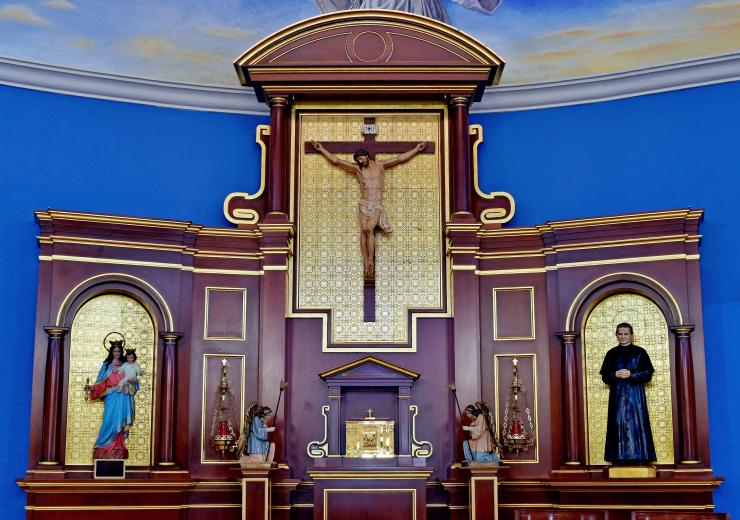(A short story about Don Bosco's life and his Mission To Love)
 (Audio Narration - Audiobook Parts 1-5)
(Audio Narration - Audiobook Parts 1-5)

Part 1: Young John Bosco
 (Audio Narration - Audiobook Part 1)
(Audio Narration - Audiobook Part 1)
God, it is said, sends the world saints when they are most needed-not men and women of "general holiness," but specialized experts who fit into the pattern of the times and are capable of giving God's tone to their century.
And so it was that on August 16, I8I5 when one era was closing in Europe with the exile of Napoleon, and the Industrial Revolution was clanging another open, "a man was sent by God whose name was John." He came to the scrubby stone cottage of Francis and Margaret Bosco on the hills of Becchi, at the foot of the Italian Alps. "A fine healthy baby," the neighbors all agreed, "fit for the soil, to take his father's place on the old homestead." But no one went further than that in predicting the child's future.
Francis died only two years after John's birth, leaving Margaret to raise three boys by herself. She taught them that they each needed to carry his weight and help with the keep of their home and farm. There were house chores to do, firewood to cut and gather, fields to plow, and crops to tend. Little John and his older brother Joseph, supervised by their stepbrother Anthony, tackled the endless work with energy. Margaret taught them that work was a privilege and that joy would make the work lighter. She was a woman of character and tenderness. All who knew her called her Mama Margaret. Fathomless was the love she showed her sons, not in coddling words but in deeds; innumerable were the lessons in upright living, Christian fortitude, and fear of God, which she taught by her example. A pillar of goodness, she stood before them as sturdy as the very Alps. At her knee John first heard the voice of the Master calling him to a special assignment. It was a low insistent voice, an urge that once in a while manifested itself in a sudden outburst, like the time Margaret and John were walking along the countryside and met one of the local priests.
"Hello, Father," cried the boy, to be acknowledged only by a curt bow of the head. Deeply hurt, he complained that the priest had hurt his feelings.
"When I grow up," he told his astonished mother, "I'm going to be a priest, and I'll talk to children all the time, and I'll do everything for them!"
Again the voice urged John to go among the farm boys, not just as a playmate but as a leader. More than once he came home with a battered cheek or torn shirt and in explanation would say, "But, Mama, those boys aren't really bad. They just don't have a good mother like I have, and they don't know their catechism, and their parents don't take them to church. When I'm with them, they behave better. Please, Mama, may I go with them?"
Soon the child took over completely, as God's plan called for. He learned the tricks of magic from traveling showmen. He juggled. He walked the tightrope. Then he opened his own carnival show. Admission: one rosary to be recited by all spectators; added attraction: the Sunday sermon, repeated by the little ringmaster. The show grounds were the field in front of the house, where Margaret Bosco often watched her son at work and wondered what might come of it all.

Part 2: The Call
 (Audio Narration - Audiobook Part 2)
(Audio Narration - Audiobook Part 2)
When John was nine, the Master called him openly. A mission as important as his could not be left to a mere urge. In a "dream," John found himself fighting a large crowd of rowdy lads who were cursing and carrying on abominably. He tried to stop them, but they refused to listen to him. Suddenly, a Man appeared, who motioned to John and said, "Not with punches will you help these boys, but with goodness and kindness!" "Who are you?" gasped the astonished boy.
Then a Woman appeared. Putting her arms around him, she said, "Watch what I do, John." John looked. The boys changed to a pack of snarling wild animals whose growls sent terror to his heart. Then the woman put out her hand. The beasts changed again, to a frolicking flock of lambs.
"But what does it all mean? I'm just a farm boy. What can I do?" He burst into tears.
The Lady's answer came to him, ever to resound in his heart, to be repeated audibly several times in his life, "This is the field of your work. Be humble, steadfast, and strong!'"
John now knew his vocation. But the priesthood meant studies, and there was no money on the Bosco farm. Even school was almost impossible. Due to the goodness of a farmer who taught him, John learned to read and write and do sums at the age of eight. His first schooling came the next year, when he hiked some three miles every morning to the country school of a priest. But the increasing hostility of his stepbrother, not pacified by John's attempts to put in extra hours on the farm, made life at home unbearable.
And so, for the sake of domestic peace, Margaret Bosco divided the paltry estate left by her husband and allowed her youngest son to go to Castelnuovo to attend public school and board with a good family she knew. Alone in the town, John soon learned the hardships of an orphan's life. He worked after school to support himself. Though he was only 15, he labored in a blacksmith shop, then as a tailor, a waiter, a pin-boy in a bowling alley, a shoemaker--anything to get a few pennies and ease his mother's burden.
At school he did exceptionally well. True, teacher and classmates had looked upon him as a country dolt in the beginning, but his brilliant memory and steadfast application soon won him everyone's respect. In one year he was ready for secondary studies.
As we look back over the records, we find that John did three years of high school in one scholastic year and one summer. How he ever succeeded is quite unimaginable, unless we take into account his exceptional memory and intensive study habits.
Throughout his school work John did not lose sight of his vocation which was now, more than ever, an actual conviction. "I'm going to be a priest," he told his friends, "and I'm going to give my life to the care of boys!"
By 1835, when John was 20, he was ready for the seminary, taking with him an enviable record for excellence in studies, a reputation for solid piety, and the friendship of countless people in many walks of life. Prominent among them was a young priest, Father Cafasso, now St. Joseph Cafasso, John's confessor, who best understood him and helped him to interpret God's plan.
Part 3: John Bosco's Ministry Begins
 (Audio Narration - Audiobook Part 3)
(Audio Narration - Audiobook Part 3)
On June 5, 1841, John was ordained to the priesthood in Turin. He celebrated his first Mass the next day in the church of St. Francis of Assisi. "During my first Mass," he said, "I asked for the gift of efficacy of speech, and I think I got it!"
With ordination came the release of a powerful spiritual energy, which, joined to his rare human gifts, was calculated to exert a lasting influence on modern youth.
The beautiful Lady of his dreams was not slow in showing Don Bosco (Don is the title given to priests in Italy) just what she expected him to do. On the feast of Mary Immaculate, December 8, 1841, the first sign came. While vesting for Mass, the priest heard the sacristan shrieking at a poor young boy who had sneaked into the church to get warm. "Here, call the boy back," cried Don Bosco, "he's my friend!" The boy came over to Don Bosco.
Don Bosco asked, "What is your Name?"
"Bartholomew Garelli" the boy answered.
"How old are you Bartholomew?"
"Sixteen," answered the boy.
"Can you serve Mass?"
"No."
"What do you do?"
"I'm a bricklayer," he responded, head lowered.
"Your mother and father..." Don Bosco continued.
"I'm alone," the boy responded sadly.
"Can you whistle?" Don Bosco broke in.
"Of course I can whistle!" exclaimed Bartholomew laughing.
And that friendship, struck up on the spur of the moment, began Don Bosco's worldwide ministry to bring young people to God. He told Bartholomew to stay for Mass.
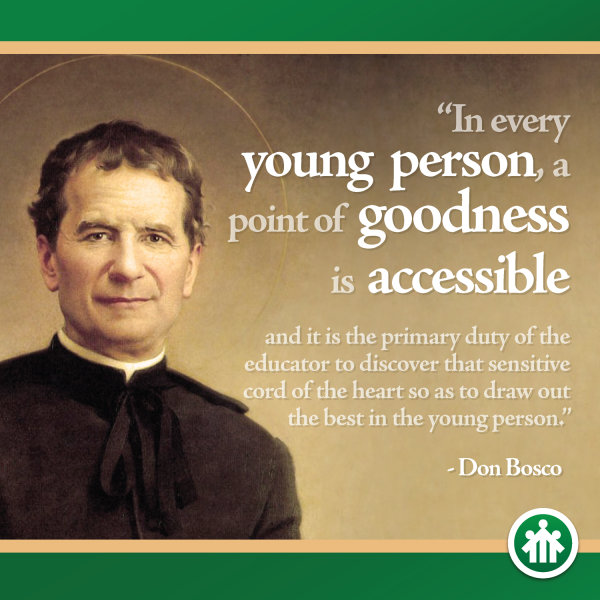
After Mass Don Bosco told the boy, "Next Sunday, bring your friends here, and we'll spend the day together."
The next Sunday, four ragged boys, looking badly in need of a meal and warm clothing, came to Don Bosco. They were certainly in very dire spiritual need. And their number multiplied in a few weeks, so that caring for them soon came to be a major problem.
"But my girls!" exclaimed the directress of the girls' orphanage where Don Bosco was chaplain, "What will become of them?"
"You can always find a priest for them," said Don Bosco, "these boys, they need me!"
Part 4: The Wandering Oratory
 (Audio Narration - Audiobook Part 4)
(Audio Narration - Audiobook Part 4)
In the 1840s the slums of Turin were overrun by the poverty that resulted inevitably from sweatshop factories with their hazardous machinery, child labor, and starvation wages. Walking through these slums, Don Bosco came face to face with his mission. As he visited the prisons with Father Cafasso, the conviction of his vocation seemed to shout within him: "These boys are not bad. Take care of them before they fall into crime--that is your task!"
With his heart full of trust in his Lady and his pockets empty, Don Bosco courageously took up the work. From then on, it was only "Give me souls--the souls of young people."
Don Bosco called his weekly band of ragged young people "the Oratory," a term which to his mind suggested prayer and organized recreation. In the beginning it was a floating thing, its membership growing daily in large proportions. There was no one place to meet because in those troublesome times people were afraid of a large group of working boys and besides, who relishes the uproar of some 200 boys enjoying a day's freedom from the imprisonment of a factory?
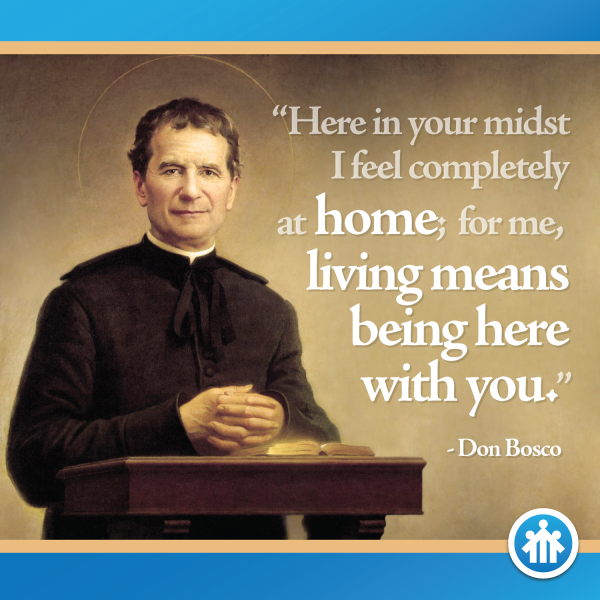
Every Sunday they would meet in a different place, a city church, a cemetery chapel, or an empty lot. Don Bosco would hear their confessions and say Mass for them. An hour of religious instruction would follow, plain, simple talks coming from the heart and embodying the solid truths of the faith. Then the priest would take his band of ragged boys into the country for an all-day outing of games. A final talk would close the "Oratory day," and the tired bunch would trail into Turin, scattering to their homes along the way.
During the week, Don Bosco used to tour the city shops, checking on his boys, making sure they had not forgotten his instructions to work hard and work well.
Those were heroic times, "those pioneer days," the saint used to call them. "Days of strenuous work they were, a shiftless existence that threatened to collapse any Sunday, a bankrupt enterprise with no capital, and very little funds." Besides this, the city leaders, worried by the new cries of "freedom for the working classes," eyed Don Bosco's boys as a dangerous, half-baked army of the children of the people, headed by an ambitious priest. Actually this tired, penniless priest sought only a chance to bring God's peace and order to the hearts of restless youth.
In 1846 the first ray of hope broke through the clouds. Don Bosco bought an empty lot and a dilapidated shed in an underdeveloped section of Turin called "Valdocco." True, next door was a saloon and across the street a hotel of shady reputation--but what did it matter? The Oratory ground was sacred, for as he later learned in a "dream," it was the burial ground of the Martyrs of Turin.
With a roof over his head, Don Bosco knew that his Lady had set the permanent basis of his work.
The shed he dug deeper and converted into a chapel, with a tiny anteroom, and every Sunday 500 boys managed quite miraculously to squeeze into it for Mass. "The Oratory of St. Francis de Sales," he called it, because he admired the gentle holiness of this great saint.
The location of the shed-chapel can still be seen today--the tiny nucleus of a worldwide organization that began in poverty with our Lady's blessing.
Part 5: The Orphanage
 (Audio Narration - Audiobook Part 5)
(Audio Narration - Audiobook Part 5)
New fields of endeavor for his boys opened themselves to the saintly priest. Homeless children, many of whom found an undesired home in its squalid prisons, overran Turin. They had to be saved before they fell!
Again, a little boy started the project. One stormy night in 1850, as Don Bosco and his mother were still awake and working, a timid knock came at their door. As Mama Margaret opened it, there he stood, tiny and dripping wet, scared, starved, blinking in the light.
"Please," he whined. "I'm hungry. Can I come in?"
As he devoured a bowl of steaming soup, he told his story: his mother had just died, the farm was taken over by creditors, and he was alone in the world.
"He'll stay with us," Don Bosco stated.
"But where will he sleep?" Mama Margaret asked.
"If necessary, we'll sling a basket from the ceiling for a bed!" laughed the priest. The boy laughed too. He was Don Bosco's first orphan.
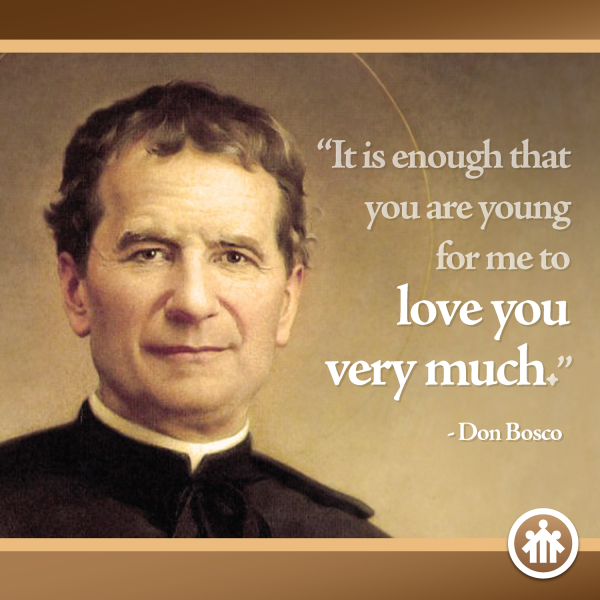
Part 6: The Trade School
(Audio Narration - Audiobook Part 6)
More orphans came. Don Bosco bought the house adjoining the shed. The boarders used to go to work or school in Turin each day, returning "home" to Don Bosco and Mama Margaret for meals, but Don Bosco soon realized that his makeshift system had too many drawbacks and that he had to have a school of his own.
One day in 1853 he took a corner of Mama Margaret's kitchen and converted it into a cobbler shop; the tiny hallway became a carpenter shop. The teachers? Don Bosco himself and two hired men. Now there was really no quiet place at the Oratory with all the banging of hammers, but in the midst of all the rumpus was born the Don Bosco Trade School. Not that Don Bosco ever called it that, but that is what the movement developed into. Today the congregation of Don Bosco operates professional training centers and college-preparatory schools throughout the world; both in highly developed countries and in many underdeveloped countries.
Part 7: The Preventive System
(Audio Narration - Audiobook Part 7)
As Don Bosco's name became famous, more priests came to help him, especially secular priests released by their bishops for this work. Though they came from different sections of Italy, they soon realized that Don Bosco had an educational system of his own, which he called "the preventive system."
Essentially it means to prevent a boy from becoming bad. It is based on Christian charity. Its double foundation is reason and religion: in other words, a sense of understanding between teacher and student, engendered by daily contact, friendly chats, and an interest that is felt; and secondly, a sense of religion fostered by the Sacraments of Confession and Holy Communion. According to the saint, where other systems of education have failed, this system of kind-understanding and mainly sincere religion, has more than succeeded.
The system is not new, though in Don Bosco's hands it achieved a freshness all its own. While it compensates for errors committed by the young, who are often changeable and always forgetful, it does not condone the errors; instead, it uses them as stepping stones to the formation of a solid character, permeated by Christian principles of Christian character.
--
Part 8: The Salesian Congregation
(Audio Narration - Part 8)
Don Bosco's times were unsuited to the founding of a new religious congregation. Those already in existence were being torn down by a diabolical campaign of political radicals, self-styled free-thinkers. Yet it was precisely a liberal-minded politician who had closed convent doors who first suggested the idea of a new religious congregation to Don Bosco.
"Start a new order and have you suppress it in its cradle?" smiled the saint.
"No, your case is different. You work for the poor. Your schools really belong to the working classes. No one will resent what you do. Make sure your religious keep their status as citizens, and we won't touch you."
And so, still under his Lady's guidance, Don Bosco set about the task. His own boys were the best material. Little Michael Rua, who idolized him, tough Johnny Cagliero, hardworking Johnny Francesia, self-willed Paul Albera, and several others. They would be the pioneers in this experiment of a new religious congregation.
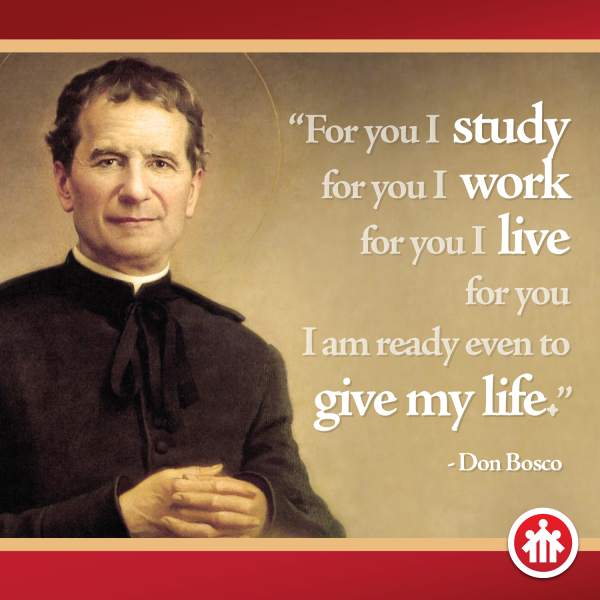
"Would you like to stay with Don Bosco?" he asked them.
"I'll do the work of four!" was Cagliero's stalwart answer. The others agreed. On the night of December 18, 1859, was born the Congregation of St. Francis de Sales (popularly known today as the "Salesians of Don Bosco" and officially titled the "Society of St. Francis de Sales").
Now came the painstaking work of organization, based on experiment and experience, and of drawing up rules for the Holy See to approve. It required a genius in the delicate art of human relations. Don Bosco was equal to the test, for in 1869 the Congregation was approved, and five years later, so were his Constitutions.
Today Salesian priests and brothers, bound by one rule, inspired by the same spirit of their Founder, are all dedicated to the double task of self-sanctification and the care of youth. Today the Salesians number over 15,700 Brothers and priests.
Part 9: The Salesian Sisters
(Audio Narration - Part 9)
Rest was out of the question for Don Bosco. Another dream-vision opened a new field of endeavor to him. He found himself in a city square, surrounded by a squealing bevy of girls. They were puny things, unkempt, with starvation in their eyes. "Come to us, Father," they cried, "We need you!"
With that pitiful wail in his ears, Don Bosco looked about for tangible proofs of his Lady's intervention. He found it in a women's sodality in a country parish. As he spoke to these young women at a meeting, he was convinced that they were the answer to a prayer. He was also convinced that their leader, a soft-spoken and utterly spiritual-minded woman of 25, Mary Mazzarello, was to be co-foundress with him of a new religious congregation for women. With his usual humility and courage he set about the task, and in 1875 he received their first vows. He called them "Daughters of Mary Help of Christians." As far as he was concerned, they were the feminine counterpart of his Salesians and a living monument of gratitude to his heavenly Helper.
Today there are more than 16,000 Salesian Sisters.
Part 10: Salesian Missions
(Audio Narration - Part 10)
As his main work secure, Don Bosco searched the horizon for new fields of labor. Again a dream-vision revealed God's plans to him. He found himself looking down upon a screaming horde of savages who were massacring a band of white men. From the distance approached a few missionaries, wearing the garb of their orders. The natives turned upon them with wild satisfaction.
Terrified by their blood-curdling yells and inhuman cruelty, Don Bosco gasped to see another group of missionaries coming through the jungles, surrounded by children. They were his own Salesians! Certainly they would fare no better than the others, but the yelling ceased. The wild faces became human again. The natives dropped their weapons and sheepishly looked up into the missionaries' faces. Then they bowed their heads in prayer!
The dream began to become a reality in 1875; at the request of Argentina and the Holy See, Don Bosco sent ten missionaries to Buenos Aires to care for Italian immigrants.
Four years later, under the energetic leadership of Fr. John Cagliero (later Cardinal), they penetrated the hinterland of Patagonia down to the icy Strait of Magellan and the Falkland Islands. In ten years, Salesian missions were established in South America from Cape Horn to the lush jungles of Brazil's Rio Negro valley.
The young Salesian Congregation ranks highly in number among the Catholic Church's missionary orders.
Part 11: Man of Action
(Audio Narration - Part 11)
"First tell the devil to rest, and then I'll rest too," Don Bosco used to say to those who urged him to let up in his activity. Indeed, rarely has the Church seen such a tireless apostle.
Trained to labor from his boyhood, he occupied himself with boys, constantly interesting himself in their activities. On Sundays, after a strenuous day with his Oratory, he often had to be carried home; more than once he fell asleep fully dressed, kneeling at his bedside. For many years he slept only five hours a night, skipping a night each week. After a day of physical work, he would spend the quiet hours of the night penning letters to friends for aid, sending letters of comfort to those who begged for his prayers, and writing books on mathematics, literature, the Bible, and Church history for boys. He began a pamphlet series, the "Catholic Readings," and for some time wrote a pamphlet a month on Catholic faith and morals. Always at the call of the Church, he was a tireless confessor; he was a popular preacher and never refused an invitation to preach a mission or a retreat.

Even when age began creeping up on him, he worked. More than once the people of Turin saw a boy leading him by the hand through the streets, dozing while he stumbled along. As an older man, he lost sight in one eye, and the other was impaired. His legs were swollen to painful proportions. His back was curved by weakness, yet his mind was crystal clear. He never laid down the burden. Besides his youth activities, he interested himself in matters of Church and State, acting even as a mediator for the Pope. He spurred boys on to Catholic action; he favored and worked for retreat movements, mission crusades, the catechetical movement, and foreign missions. Though urged by his personal friend Pius IX to rest, he would answer, "While I have time, I must work."
Part 12: Man of Prayer
(Audio Narration - Part 12)
While at prayer one time, Don Bosco was interrupted by the visit of a wealthy noble. "Tell him I'll be there soon," he said, and he continued his prayers. Three times he was called. Finally he went. "My dear sir," he said, "you are a good friend of mine, but God comes first." He also used to repeat, "First of all Don Bosco is a priest!"
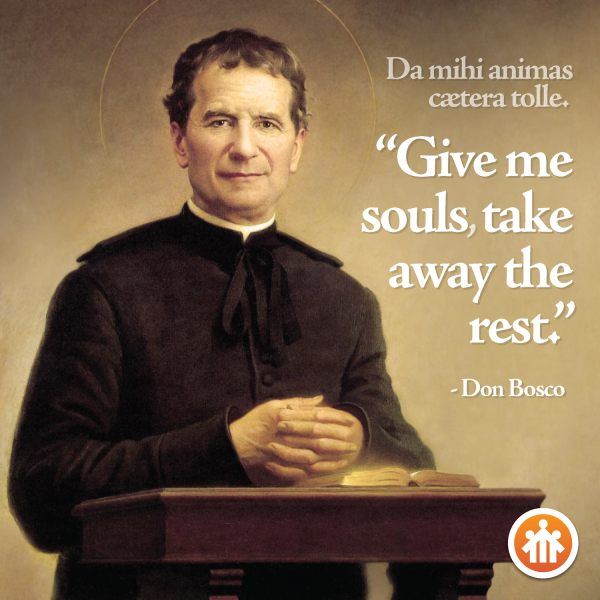
With such a marvelous sense of values, he was able to temper his activity with deep, ceaseless, and fervent piety. In fact, the energy of his work came from this carefully tended fire of prayer in his soul. And God rewarded him in a wonderful way. Toward the end of his life, his prayers wrought miracles. His blessing carried astonishing powers. Sometimes he was seen rising in ecstasy during the Mass. But, with characteristic humility, he labored to feed his ministry with prayer; so much so that Pope Pius XI said of him that he prayed every moment of his life.
Part 13: Man of Poverty
(Audio Narration - Part 13)
When Don Bosco planned to build a basilica in Mary's honor in Turin, he drew up the plans and called an architect to start the excavations. "Here is your first payment," he said, handing the astonished man eight cents. "Mary will build her own basilica." This was characteristic of Don Bosco: living in personal poverty while spending millions for God. "When you become a priest," his mother had told him, "if ever you become rich, I shall never enter your house!" Describing his life, he would say, "I am poor, penniless Don Bosco, a shepherd boy of the hills. I have lived poor and shall die poor."
Yet this impoverished priest, who lived on the coarsest of foods and wore the poorest garments (often borrowed), spent millions for his boys, opened large schools, built one basilica to Mary in Turin and another to the Sacred Heart in Rome, and financed great mission expeditions. The faith that God would provide worked miracles in his life.
Part 14: Don Bosco's Holiness
(Audio Narration - Part 14)
Such generosity of spirit could not go unrewarded by God, for whom this priest slaved the 72 years of his life. Besides providing for his work, God gave him the gift of miracles. With his blessing, Don Bosco cured people disease. After his prayers on their behalf, the deaf heard, the lame walked, and once, a dead boy was raised to life. He had the gift of prophecy. He could read consciences, and used this gift to assist penitents in confession. He could foretell one's vocation, as well as one's future.
All these gifts were so common that Pope Pius XI said, "In Don Bosco the extraordinary becomes ordinary." They were given to him in partial reward for his exceptional self-sacrifice and as a seal of divine approval of his work.
Don Bosco often told his young people that being a saint was easy. His holiness was attractive because it was rooted in charity and exceptional purity that drew people to him. Though he sometimes did extraordinary penances, he would never allow them to his boys. "Sanctity is easy!" he would say. He told his Salesians and the young people that God wants us to be happy and to rejoice in the love of Jesus. Just do your duty in school, at home, at work the best you can. Offer you life to God: the happy times and the sad or challenging things: life sends many opportunities to join in the sufferings of Jesus: bad weather, disappointments, physical illness, sorrow these will make you saints. St. Dominic Savio, one of his students who died at the age of 14, is Don Bosco's proof to the world that holiness is not a monopoly of the monastery or of the desert. It belongs everyone, the young and the old.
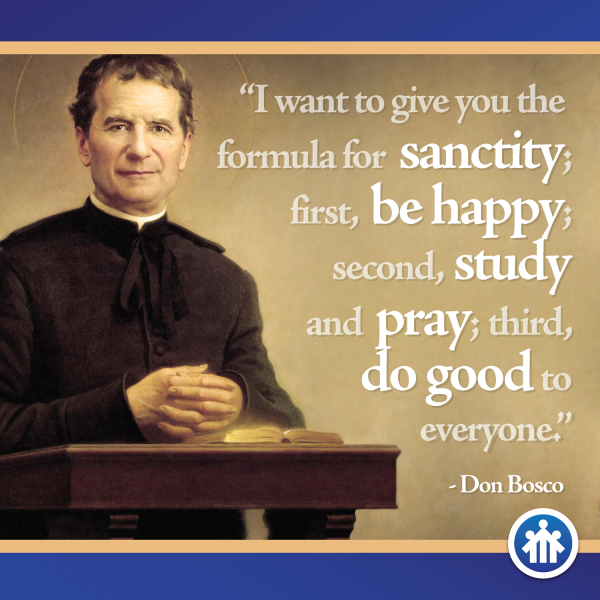
The last years were difficult for him. He was old and tired but he kept up with all the activities of his Salesians, inspiring them to greater achievements for youth. But when he took to his bed in December of 1887, he said, "Now I go to my rest; I shall not get up again." Just before his death, he summoned his sons and begged the favor of their prayers. "Do not ever forget these three things: devotion to the Blessed Sacrament, devotion to Mary Help of Christians, and devotion to (always be in support and come to the defense of) the Holy Father!" On January 31, 1888, Don Bosco's worn-out body finally yielded to nature. With the names of Jesus and Mary on his lips, Don Bosco's soul passed to his God and his Lady as the morning Angelus bell was summoning the faithful to prayer. "Our saint has left us," the people of Turin mourned.
Don Bosco left a legacy. His ideals, his spirit, his constant activity are all still with us in his Salesian priests, brothers, and sisters, who strive to perpetuate his work on earth.
On Easter Sunday, April 1, 1934, Pope Pius XI declared Don Bosco a saint; the Pope styled him "a giant of sanctity."
As for himself, Don Bosco would say, as he often told his admirers, "I have been an instrument in the hands of Mary. She has done everything. Had I been a worthier instrument, I would have accomplished a great deal more."

-----------
Don Bosco's liturgical feast day is January 31st. St. John Bosco, pray for us and for all the young people in the world!
The original title of this brief story about Don Bosco is "A Man Sent by God." It was written by Fr. Paul Aronica, SDB in 1988 and published by Salesiana Publishers. This revised web version will occasionally be updated with minor edits as time allows for our Salesian Brothers and Priests.
The Don Bosco quote graphics were designed by Peter D. Le, SDB.
donboscowest.org